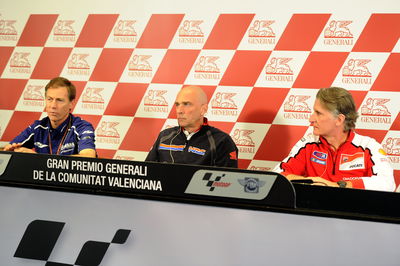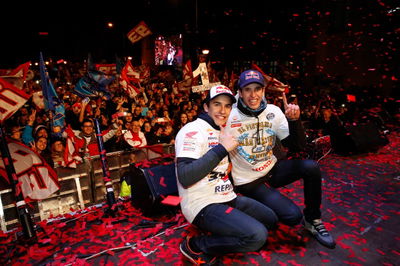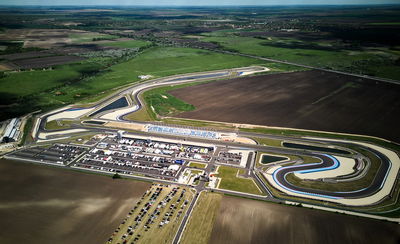Honda, Yamaha discuss Ducati advantages

Honda and Yamaha feel the technical advantages handed to Ducati in MotoGP this season were proportionate - and necessary to keep the Italian factory in MotoGP.
Believing new engine-freeze rules would unfairly penalise teams not already winning - especially since it would also limit chassis development - new Ducati Corse general manager Gigi Dall'Igna surprised Honda and Yamaha by planning a pre-season switch from the Factory to Open class.
Open was a replacement for the privateer 'CRT' category, but crucially the former 'claiming rule' had been dropped. Intended or not, this change meant that the latest factory prototypes could be converted to Open spec - unlocking a range of performance perks - simply by fitting the control ECU.
This shared ECU, the only Open class drawback, then received a major Ducati-inspired update just days before the manufacturer switched categories.
Honda - already stung by Yamaha providing a pair of leased 2013 YZR-M1s for the Open class, which would clearly out-power Honda's new 'for sale' Open bike - made its displeasure clear.
"If Open class is with the Factory bike, very sophisticated software, more fuel, more tests, more engines - then it is not a cheaper class compared with the Factory bikes. And I think this was the aim of the rule. To create a cheaper class... Now, with the interpretation of Ducati, it is not," Repsol Honda team manager Livio Suppo said at the time.
In the end a compromise was reached whereby Ducati would remain in the Factory class, but with all of the Open class benefits and the bespoke factory ECU software it had been prepared to surrender - in return for certain performance limits.
The four-litre Open class race fuel advantage would be halved if Ducati riders achieved a race win, two second places or three podiums in dry conditions. If Ducati claimed three wins, their riders would also lose the softer rear tyre.
These limits addressed fears that Ducati might gain a huge performance advantage from the Open rules.
However all of the other technical concessions - such as twelve instead of five engine changes, no engine freeze and extra testing opportunities - would stay in place until the blanket introduction of a control ECU in 2016.
While such hybrid Factory/Open rules only applied to Ducati this year (as a manufacturer without a race win in 2013) they also relate to any 'new' manufacturer, meaning Suzuki and Aprilia will race with the same regulations next season.
Podium-less in 2013, Ducati did take three rostrums this year. However only a third place by Andrea Dovizioso at Austin was in the dry. And while the softer rear tyre clearly helped in qualifying, it often proved a disadvantage in the race, when Honda and Yamaha riders had exclusive use of the harder compounds.
Honda aiming to keep Ducati in MotoGP
Assessing the impact of the special Ducati rules during the season-ending Valencia round, Suppo said that Honda has always been prepared to help other manufacturers stay in the sport and that the level of performance gain handed to Ducati has been 'reasonable'.
"Honestly speaking I think as Honda we always agreed - for example with Suzuki also we did something similar," said Suppo, referring to when Suzuki were given more engine changes in the past. "This is a competition and it is good, as it will be next year, with many manufacturers. The more manufacturers here the happier we are.
"We totally understood that last year the results of Ducati were not enough to make everybody happy and this means [we needed] to improve the chances of Ducati remaining in this championship for a long time. This is our aim because Ducati is a strong brand and brings value to this championship.
"So I think it was correct to give some advantage and we think at the moment it is still reasonable. I think the level of performance is getting closer. If they start winning 10 races in a row then maybe we need to think about it [the rules]! At the moment I think it's okay. Anyway in 2016 we will start again with all the factories on the same level."
Yamaha: Ducati advantage 'tough' for satellite teams
While race victories and the title outcome were not affected by the Ducati advantages - lead rider Dovizioso finishing fifth overall in the standings - Yamaha racing managing director Lin Jarvis feels the main victims of the Ducati benefits have been the satellite Yamaha and Honda teams.
"I have a similar opinion to Livio. I think for the factory teams it's not really a big issue because there are four riders at the front and Ducati's [advantage has not really affected the championship as such," Jarvis said. "I think it has made it a bit difficult for the satellite teams to maintain motivation because there are some circumstances where their riders are performing exceptionally well and may be beaten [by Ducati riders], whether it's in qualifying or a race.
"So I think it's quite tough to be a satellite factory team when you are restricted [by the Factory rules]. I think the key point is to end up as soon as possible with one set of rules and to get away from the situation at the moment where we have three different classifications [Factory class, Factory with benefits and Open class]. I don't think that is good for the participants or the spectators."
Ducati 'embarrassing' in 2013
Ducati Corse sporting director Paolo Ciabatti is satisfied with the progress this season, after a 'very embarrassing' 2013.
"We've had a good season and have progressed throughout the season. Obviously we are allowed to keep developing our bike, with some concessions, but this is what we needed after a very embarrassing gap to the top in 2013," he said.
"This year our main goal was to be within 10 seconds of the winner and we achieve that. We have proven that we can be very fast in qualifying and we achieved three podiums. We also almost got another second place with Cal at Phillip Island."
While Ducati have doubtless improved, the big question is how much has been down to the Open class technical advantages and how much due to machine development.
That will only be answered when all manufacturers are racing under one set of technical rules in 2016, although the change from Bridgestone to Michelin tyres will blur any direct comparisons with the previous season.
"Obviously we can use up to 24 litres of race fuel, but basically the most important allowance is the freedom to keep developing the engine - not only for the engine performance itself but also the engine is influencing the chassis," replied Ciabatti, when asked how the Open rules have helped Ducati's progress.
"If you need to change the mounting points of the engine, with a frozen engine you cannot do it. Obviously we have the freedom to change some things and bring the GP 14.2, which is an evolution of the GP 14. We could only do this because we could modify the engine. I think that is the most important thing.
"The tyres give some advantage in qualifying, but only twice could we use our soft option in the race. So it is not in general an advantage for the race, only for a few tenths of a second in qualifying. The possibility to do testing with our factory riders has also helped us to speed up the development process and improve our performances."
While Honda and Yamaha have already begun testing their 2015 bikes in the hands of race riders, the new Ducati will not debut until next February's official tests at Sepang.
"The new bike is a little bit late and won't be seen until Sepang, but Gigi said it is better to start a little bit late with things right than rushing the debut and then having to fix things," said Ciabatti. "It looks like we are putting things in the right direction and we are very confident that we will be able to challenge for race wins next year."
Ducati entered MotoGP in 2003, winning in its first season and claiming title glory with Casey Stoner in 2007. However the factory has not won since Stoner departed at the end of 2010, with a major restructuring put in place after Valentino Rossi struggled to three podiums in two seasons at the team.
Andrea Iannone will join Dovizioso at Ducati's factory team in 2015.
Honda will scrap its RCV1000R Open class bike after just one season, in favour of a new factory-powered RC213V-RS model for 2015. This bike, like the Yamaha and Ducati Open class machines, will be leased.












